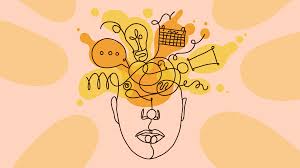Although attention deficit hyperactivity disorder (ADHD) is frequently linked to childhood, its effects go much beyond that time. People with ADHD face distinct possibilities and challenges throughout their lives, depending on where they are in their development. Living with ADHD across the lifespan offers a complex interplay of strengths and problems, ranging from childhood struggles with social skills and academic success to adult difficulties in the workplace, relationships, and self-esteem. The experiences of people with ADHD are examined in this essay from childhood to maturity, emphasizing how the illness is dynamic and what coping mechanisms can help at each stage of development.
Growing Up: Managing Social and Educational Environments
Since concentration, impulse control, and hyperactivity issues are revealed by the demands of school and social environments, childhood is frequently the time when symptoms of ADHD first emerge. Inattention and disorganization can have a negative impact on academic achievement, which can cause frustration and low self-esteem. Children with ADHD may find it difficult to stay focused, follow directions, and finish homework, which can lead to academic underachievement and a higher chance of failing their classes.Children with ADHD may also struggle in social situations. Friendships might be difficult to establish and sustain because of impulsivity and emotional dysregulation, which can cause conflict with peers. The disorder’s emotional toll is further exacerbated by the prevalence of social rejection and feelings of solitude.In order to properly address these difficulties during childhood, early intervention is essential. Medication, educational modifications, and behavioral treatment can all help control symptoms and enhance social and academic performance. Resilience and positive results can only be fostered and promoted by creating a supporting network of educators, parents, and mental health experts.
Teenage Years: Getting Ready for Independence
For those with ADHD, adolescence presents unique difficulties as they adjust to growing independence and responsibility. Adolescence is a particularly tough period for those with ADHD because of the combination of hormonal changes, scholastic pressures, and social expectations.As the pressures of high school increase during puberty, academic performance continues to be a problem. Deficits in executive function, such as ineffective time management and organization, can impede academic achievement and fuel emotions of inadequacy. Furthermore, teenagers with ADHD may experience social challenges that worsen their anxiety and sadness due to the intricacy of peer dynamics and social connections.
Adolescence offers chances for development and self-discovery despite these difficulties. Teens with ADHD can become successful academically and socially by learning coping mechanisms and self-advocacy techniques from adults who provide them with the right support and direction. Developing skills like resourcefulness, inventiveness, and resilience can help teenagers with ADHD make the confident move to adulthood.
Managing Work, Relationships, and Self-Identity as an Adult
As they negotiate the complexity of job, relationships, and self-identity, adults with ADHD encounter both fresh opportunities and problems. Adults with ADHD may face substantial difficulties meeting the responsibilities of the workplace, which include organizing, paying attention to detail, and managing their time well. ADHD symptoms may have an impact on career choices; some people may find it difficult to find a good fit, while others may be drawn to fast-paced, high-stimulation workplaces where their impulsivity and inventiveness can flourish.ADHD can also have an impact on relationships since it can cause problems with impulsivity, emotional control, and communication. Partners may become frustrated and argue because they are unable to comprehend how ADHD affects their loved one’s conduct. Nonetheless, despite the difficulties caused by ADHD, relationships can flourish with open communication and mutual support.
ADHD can have a significant impact on self-identity since it can cause people to struggle with emotions of guilt, stigma, and self-doubt. Embracing one’s individual strengths and weaknesses and cultivating a good self-image require acceptance and self-compassion. People with ADHD can campaign for more understanding and acceptance in society and build a feeling of pride in their identity by redefining the condition as a neurodevelopmental difference rather than a deficit.
Coping Mechanisms and Assistance Throughout Life
People with ADHD benefit over the course of their lives from a variety of coping mechanisms and specialized support networks. Psychoeducation and self-management methods assist people in comprehending their symptoms and creating practical management plans. Cognitive-behavioral therapy (CBT) enables people to develop resilience and adaptation by addressing underlying problems including low self-esteem and unfavorable thought patterns.
For many people with ADHD symptoms, medication is still the mainstay of treatment since it reduces symptoms and enhances day-to-day functioning. Behavioral therapies and psychosocial support, along with medication, are the most effective combinations for achieving a comprehensive treatment plan.For those with ADHD, peer support groups and online forums are a great way to meet people who have similar struggles and experiences. These networks lessen feelings of loneliness and encourage self-acceptance by giving users a sense of validation and belonging.Throughout life, family support is also essential since parents, siblings, and spouses can offer both practical help and emotional support. Families can establish a supportive atmosphere that improves the resilience and general well-being of individuals with ADHD by encouraging empathy, understanding, and transparency in communication.
In summary
At every developmental stage, living with ADHD offers a different combination of opportunities and challenges. People with ADHD travel a complex path full of strengths and challenges, from early difficulty with social skills and academic achievement to adult troubles with employment, relationships, and self-identity. Nonetheless, people with ADHD can have happy, meaningful lives, embracing their individuality and making valuable contributions to society, if they receive the right support, understanding, and resilience. We can build a society where people with ADHD are celebrated for their contributions and respected for their abilities throughout their lives by promoting an acceptance and empowerment culture.





